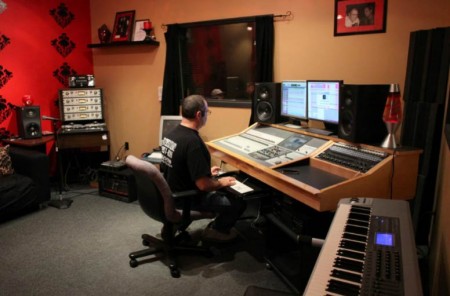Radio Connection mentor Jay Dixon on positioning yourself and getting a real world understanding of radio
When it comes to experience in radio, they don’t come to us more experienced than broadcasting veteran and Radio Connection mentor Jay Dixon. Starting in his early teens (when his brother Donny taught him electronics and he learned to build his own pirate radio transmitter), he immersed himself in broadcasting by bugging college DJs in his hometown of Boston, eventually working himself into a job doing high school reports for local commercial radio. Today, Jay is a programming consultant for Hot 97, one of New York City’s most popular hip-hop radio stations as well as WBLS New York and KBLX in San Francisco. As such, he’s able to give his students an up-close vantage point for what the industry is really like while helping them identify and play to their strengths.
In the interview below, Jay talks a bit about how he came up in the industry, shares his thoughts on what he tries to impart to his students, and even takes time to brag on a couple of his apprentices. Enjoy!
* * * * *
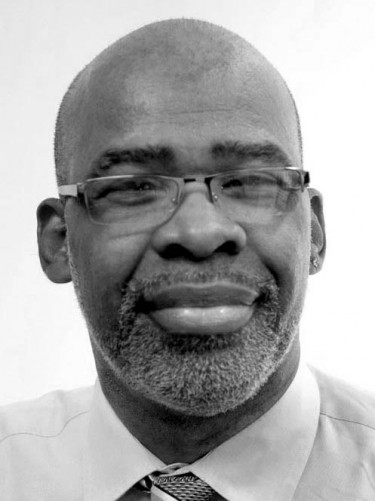
Radio Connection mentor Jay Dixon
Yeah, there were college radio DJs that I used to visit from Boston…It was easy to approach those DJs because they were in college. They were like, “Oh, look, there’s a kid in my studio here. He’s asking questions.” So there was a guy named Dave Goblaskas at WERS, Emerson College in Boston. There was a guy that worked in a commercial station in Boston, Sonny Joe White at WILD, who was a very big influence in my career. There were people at Northeastern University like Fran Scarver, Paul Porter, and Harold Austin. And I had a chance to sit in the studio and watch these guys while they were on the air. And that was pretty fascinating while I was a teenager. And then in 1977, I got a chance to do high school reports on WILD, where I would go to different schools around Boston with a tape recorder and record what was happening in schools and make my own reports…My first commercial job was actually doing reports from high schools around Boston.
RRFC: What are the benefits of actually being there in the station and watching somebody do it?
Jay: It’s very important. Some people learn better that way. People learn better when they’re actually watching somebody and they say, “Oh yeah, I get it. I see what they’re doing and how they’re doing it.” They have a chance to practice it on their own. I think that’s very important.
RRFC: Is there something to be said for building a professional relationship with someone who’s a professional, seeing them doing it, and then being able to grow your confidence that way?
Jay: Those relationships last a lifetime because you find that you continue to learn from those people that you start out with. A lot of times, you grow with those people.
RRFC: It sounds like a lot of people helped you grow along the way. When you mentor someone today, what do you try to pass on through that relationship?
Jay: The level of quality and the high standard that I set for myself. I see the professionals that I’ve worked with, the high standard that we set. That’s what I look forward to in mentoring is making sure they know where that bar is set. For example, one of the lessons that I think is very important is show prep. When you talk about show prep, I’ve worked with people that did not believe in or did not know how to do show prep. When I got to work with them, when I was their program director, I found out that no one really told them the value of doing it. They went in and winged it on the air, and it sounded like it.
There’s two things that I want to accomplish: making sure that the bar is set very high, or is set high in a way where they’re comfortable with it based on their skills and their talent; and then the other thing is knowing where their strengths are, and reinforcing that so that I’m not teaching them all the same way, or teaching them how to sound like anybody but their self. In the early days of radio, a lot of people, a lot of announcers tried to sound like other announcers. That’s how they got a job. Whereas today, outside of radio broadcasts…there are a lot of digital opportunities for my mentees. One of my mentees, Leonora, works on DTF radio, which is an online radio station. And she does a very good job. The lessons we learn here, she applies on DTF radio.
RRFC: Can you talk a little bit about Leonora? Can you tell us anything you helped her refine about her approach?
Jay: Yes, Leonora is very talented. And what I like about her style is that is she’s very street savvy. She knows the music. We can sit here and talk about todays’ music in a very open and honest kind of way: what records are trending, what artists are relevant or not so relevant. She does a talk show on DTF radio where they talk about a lot of issues that are pop culture, hip-hop centered. She sounds very knowledgeable about what’s going on in this culture right now; she presents it in a very professional style.
RRFC: Let’s say I want to work in radio, but I don’t know where; I just know I want to be one of the voices on radio. How would you then work with me to help guide me and say, “You might do well in this arena, but you probably wouldn’t do well there.” Would something like that take place?
Jay: Oh yeah, absolutely. One of the students that I just started working with, Regina Alvarez, she was born in Mexico. She has an accent, and she is bilingual, and I look at that as an asset. I say, “Look, there are a lot of Spanish-speaking radio stations in New York, and you speak English. So if there’s a way we could refine your talents, your skill sets, whether it’s in writing, producing, announcing, commercials, we’re going to explore that.”
So one of the first things that I had her do was listen to HOT 97 and make notes on how the radio station was put together, but also Spanish radio station WSKQ (La Mega), here in New York. And we analyzed everything that they were doing and applied to the lessons that we have, as far as what promos are, sweepers are, commercials, commercial stop sets, music sweeps…So it gave her an opportunity to look at radio in a totally different way where she understood the mechanics of how things were put together that could apply across a broad range of skill sets that she has.
RRFC: It’s great that you have such a practical approach that’s also very macro, and you’re using the real world example.
Jay: That’s what New York is, real world. Sometimes you can’t get more real world than New York. And that’s a good thing, too, because the way it is here, at HOT 97, and a lot of times my mentees are with me when I have very serious competitive, or strategic, or tactical conversations with the program directors that I work with, or the mix DJs or the announcers. And I want them to be a part of that so they can actually understand what they are doing and how it will apply in the real world, in a very fast-paced, competitive, even sometimes stressful environment like this.
RRFC: Could you share a few words about what you think about the industry today, where it’s headed? Is there anything good on the horizon for us?
Jay: [Some] people in the radio business think that it’s breaking, but it’s actually growing in other areas, particularly in mobile and digital podcasting. There are more people that are doing online radio stations and their own online radio shows…So because there are going to be more choices, what I’m making sure [students] know is that you have to make the most compelling case or reasons for people to choose you, or an audience, even if it’s a niche audience, they want to choose and stick with you over all those other choices out there. That’s what I see in all of them is that they have the ability to do that.
* * * * *
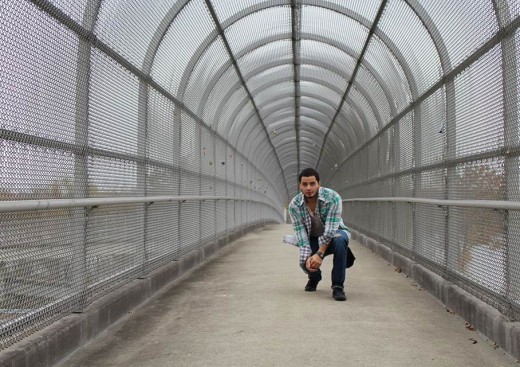
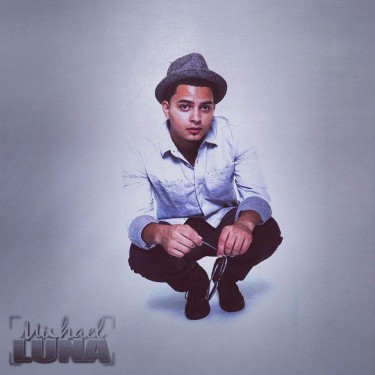 There’s also growth at the Lo-Kal Hit Factory, he says, as artists both locally and from other areas are recognizing the level of quality they are producing. “The quality of sound has been the best that they’ve been able to attain since they started their career,” he says. “Being able to provide that for individuals that weren’t able to seek it somewhere else, and really develop their sound, has meant a lot to us over at Lo-Kal Hit Factory for our local scene.”
Does Michael have any advice for other Recording Connection students, now that he’s gone through the program? “Focus,” he says. “Focus on the end result because, in the beginning, learning might be the hardest thing because I’m sure there are individuals that walk into this that don’t understand a thing about audio engineering or music in general. But when they apply their energy on the outcome at the end, then everything in between it is going to be smooth. They will be able to digest the knowledge from the mentors. They’ll be able to apply what they’ve learned into action and start touching, start playing with plugins and the compressors, and recording to shortcuts on your keyboard. Something small as that can make the difference in an audio engineer.”
For Michael himself, he says his time as a Recording Connection apprentice has made all the difference for his own career. “I have to thank the Recording Connection and Joey for all of that,” he says, “because if I didn’t make those moves to progress my knowledge and really grow as an audio engineer, then a lot of this stuff… I would be a few years behind.”
Check out a track by Michael Luna in the Students’ Work section below.
There’s also growth at the Lo-Kal Hit Factory, he says, as artists both locally and from other areas are recognizing the level of quality they are producing. “The quality of sound has been the best that they’ve been able to attain since they started their career,” he says. “Being able to provide that for individuals that weren’t able to seek it somewhere else, and really develop their sound, has meant a lot to us over at Lo-Kal Hit Factory for our local scene.”
Does Michael have any advice for other Recording Connection students, now that he’s gone through the program? “Focus,” he says. “Focus on the end result because, in the beginning, learning might be the hardest thing because I’m sure there are individuals that walk into this that don’t understand a thing about audio engineering or music in general. But when they apply their energy on the outcome at the end, then everything in between it is going to be smooth. They will be able to digest the knowledge from the mentors. They’ll be able to apply what they’ve learned into action and start touching, start playing with plugins and the compressors, and recording to shortcuts on your keyboard. Something small as that can make the difference in an audio engineer.”
For Michael himself, he says his time as a Recording Connection apprentice has made all the difference for his own career. “I have to thank the Recording Connection and Joey for all of that,” he says, “because if I didn’t make those moves to progress my knowledge and really grow as an audio engineer, then a lot of this stuff… I would be a few years behind.”
Check out a track by Michael Luna in the Students’ Work section below.
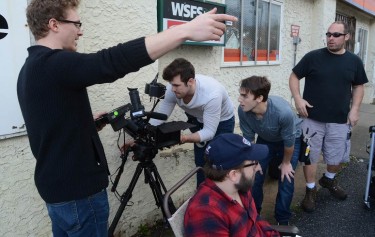 Thanks to the skills he was able to develop as a student, Film Connection apprentice Evan Zentar (Marlton, NJ) just scored a major job offer as a camera op and editor for a combat sports production company. Not too bad considering he’s 20. Congrats, Evan!
Thanks to the skills he was able to develop as a student, Film Connection apprentice Evan Zentar (Marlton, NJ) just scored a major job offer as a camera op and editor for a combat sports production company. Not too bad considering he’s 20. Congrats, Evan!
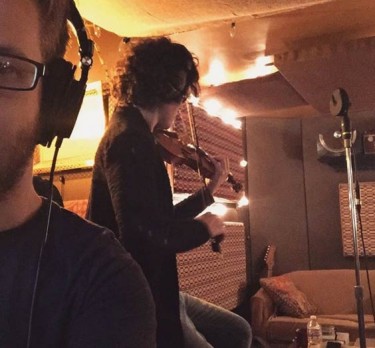 Travis Ball (Nashville, TN), an apprentice through the Recording Connection “Learn from Legends” program, recently recorded renowned violinist Tim Fain for a secret Mae project. Travis is having a whirlwind time being on hand with mentor Ryan Hewitt (blink-182, The Dixie Chicks, The Red Hot Chili Peppers) as he produces, engineers and mixes a 5-song EP in 10 days. Despite the intense schedule ahead of them, Travis was impressed by the way Ryan spent the entire day going through the pre-production process, interfacing with the band to get the set list right and facilitate finalizing arrangement ideas, lyric adjustments, and more, so that they’re in solid shape for tracking the next day.
Travis Ball (Nashville, TN), an apprentice through the Recording Connection “Learn from Legends” program, recently recorded renowned violinist Tim Fain for a secret Mae project. Travis is having a whirlwind time being on hand with mentor Ryan Hewitt (blink-182, The Dixie Chicks, The Red Hot Chili Peppers) as he produces, engineers and mixes a 5-song EP in 10 days. Despite the intense schedule ahead of them, Travis was impressed by the way Ryan spent the entire day going through the pre-production process, interfacing with the band to get the set list right and facilitate finalizing arrangement ideas, lyric adjustments, and more, so that they’re in solid shape for tracking the next day.



